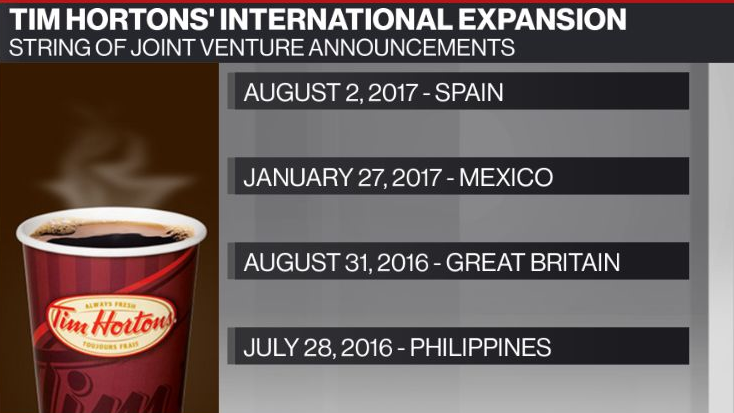Jul 11, 2018
Tim Hortons looks to bring ‘best of Canada’ to China with 1,500 stores
The president of Tim Hortons is aiming to bring the “best of Canada” to the world’s second-largest economy with its plan to expand the coffee and doughnut chain into China.
“This is the perfect moment, I believe, for us to go into China. We’ve matured in our understanding of the Tim Hortons brand as a management company,” Alex Macedo told BNN Bloomberg in an interview Wednesday.
Tim Hortons said it will partner with Cartesian Capital Group in a joint venture that aims to open 1,500 Tim Hortons restaurants in China over the next decade.
“The market for coffee and baked goods is growing in China – so we really think that it’s the perfect combination to take Canada’s favourite coffee to the biggest country in the world in terms of population.”
Financial terms of the agreement were not immediately available.
“Our strategy is two-fold,” Macedo said. “It’s really to start to drive fast growth in Canada again, and that’s where most of our focus and attention is dedicated. But also, the second part of the strategy is to bring the best of Canada to the world through our beloved coffee and through our product items.”
Macedo added the aim is to bring Canadian friendliness and hospitality to customers in China, but noted there will be a lot of localization when it comes to food menu items.
“What we’re going to write on our walls and getting into the restaurant is basically, ‘welcome to Canada, welcome to Tims,’” he said.
Macedo added franchises won’t be family-operated like many are in Canada, at least not initially.

Tim Hortons has more than 4,700 restaurants around the world, and entered four new markets last year: Spain, the Philippines, the U.K., and Mexico.
In 2012, Cartesian Capital partnered with Tim Hortons parent company Restaurant Brands International and the Kurdoglu family to develop the Burger King brand in China.
There are now more an 900 Burger King restaurants in China.
"We are excited to expand our partnership with Restaurant Brands International to bring Tim Hortons to China," Cartesian managing partner Peter Yu said in a statement.
"Tim Hortons has a long, rich history of providing guests with quality food and premium coffee. We plan to expand that tradition to China, drawing on 20 years of experience building businesses in China and around the world."
In addition to Tim Hortons and Burger King, Restaurant Brands owns the Popeyes brand.
With files from the Canadian Press



